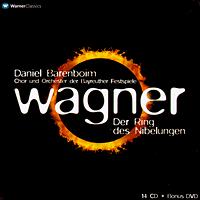
Moments of crisis?
'Die Walküre' from Bayreuth -
the second review in a series by ROBERT HUGILL'Barenboim's 'Ring' continues to be a gloriously recorded, richly detailed orchestral experience.'
|

|
Barenboim's Die Walküre opens with a quite brisk account of the prelude. It is almost light at times. The opening scenes of Act 1 are undoubtedly dramatic, but without the dark undertow, the sense of something going to happen. Over the whole Act, Barenboim does keep the tension up, just about, but does not turn the screws very tight. The whole act is naturally paced (I keep returning to my comment about Das Rheingold being well modulated) but Siegmund's arrival should set up an underlying tension which is not released until the end of the Act. And that does not really happen here.
Poul Elming and Nadine Secunde do make a passionate pairing as Siegmund and Sieglinde, but here again the passion is well modulated; it only becomes overwhelming in the Act's closing moments. Secunde makes a smoky, mezzo-ish Sieglinde. She rides over the orchestra at climaxes, but I would have liked more focus, more centre to the voice
[listen -- CD3 track 14, 0:00-1:22].
Elming's voice is bright and brilliant, so much so that there is often an uncomfortable glare in the recording of his higher registers. He is a naturally dramatic tenor but can sing with a good line. He rises to the occasion in the Winterstürme and, as is often the case in this Act, succeeds in giving the most vivid performance
[Listen -- CD3 track 13, 0:18-1:41].
Act 2 opens with a feeling of visceral excitement. Anne Evans is a very lyric Brünnhilde; she never seems to over-stretch the voice and as a result gives the sort of well phrased, beautifully shaped performance which sopranos can rarely do in this role
[listen -- CD4 track 2, 0:27-1:06].
Not every Brünnhilde can be Birgit Nilson, Gwynneth Jones or Rita Hunter, and too often, sopranos sound as if they are simply straining every muscle to make as much noise as possible in the role; not Anne Evans, and this gives her scope to shape the part well. But there is a down side to this. She does not ride the orchestra easily. Anyone coming to this set hoping for a gleaming dramatic soprano who can ride the climaxes of Wagner's orchestra with a gloriously focused voice will be dissatisfied.
Tomlinson's Wotan is a vivid as ever. At times he sounds positively neurotic, particularly his cries of Das Ende. Compared to him, Evans's Brünnhilde comes over as calm and unflappable in a crisis. Linda Finnie's Fricka remains a disappointment and her dialogue with Tomlinson in this Act does not feel balanced. Finnie's voice does not have enough centre, enough edge for my taste; musically and vocally she does not dominate, which makes Tomlinson's capitulation to her all the more a surprise. Finnie also tends to rather over exaggerate the final consonants of words and phrases; a habit which can become annoying
[Listen -- CD4 track 4, 1:04-2:15].
Continue >>
Copyright © 7 August 2005
Robert Hugill, Strasbourg, France

|

